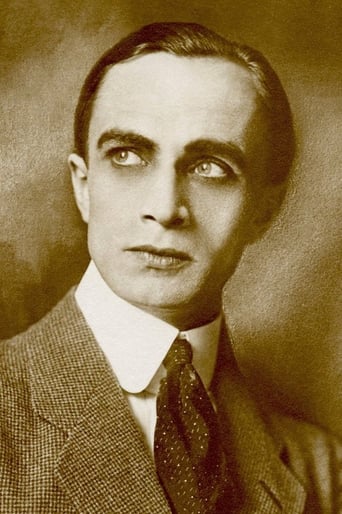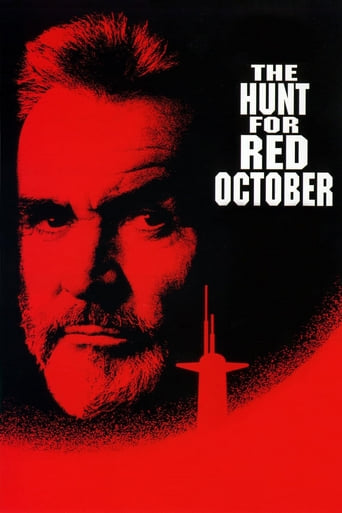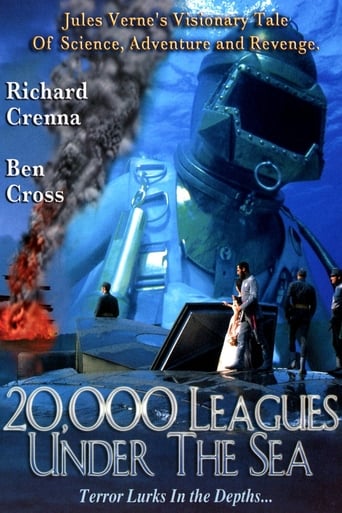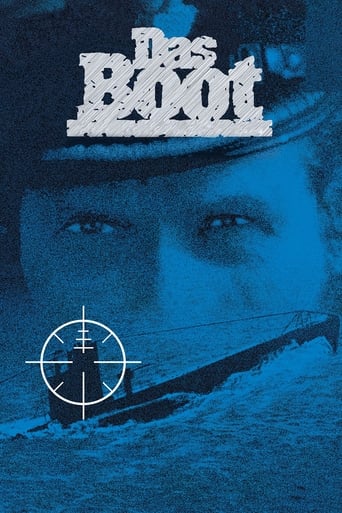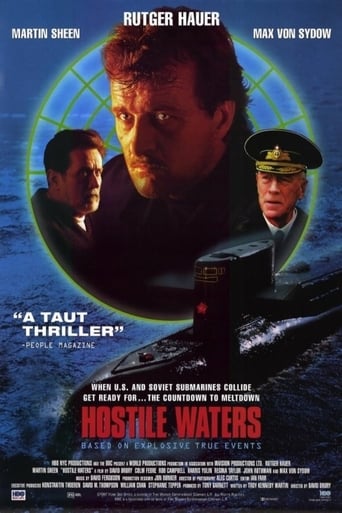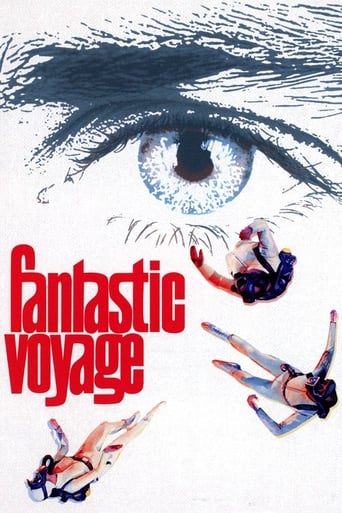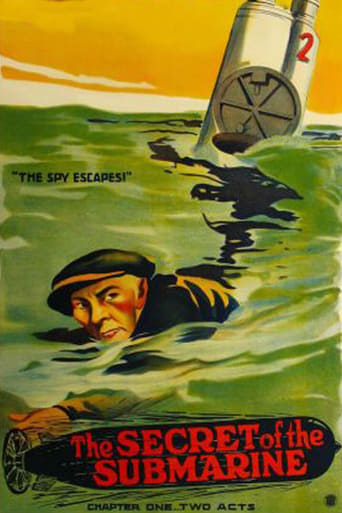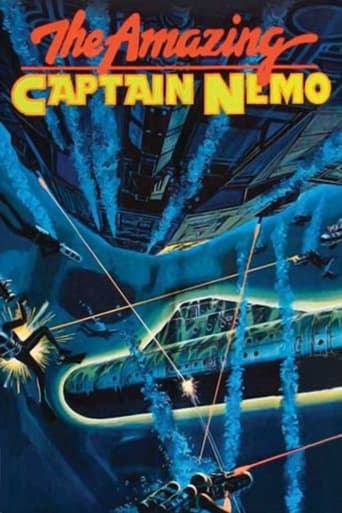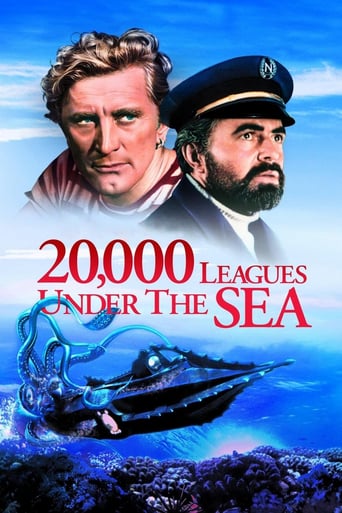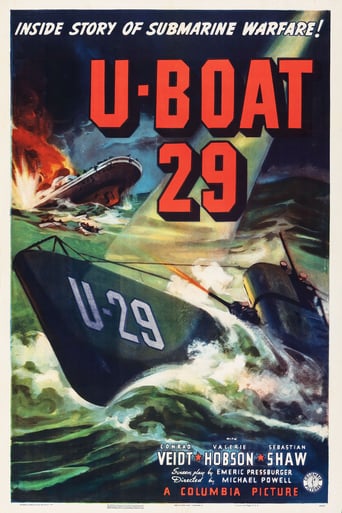
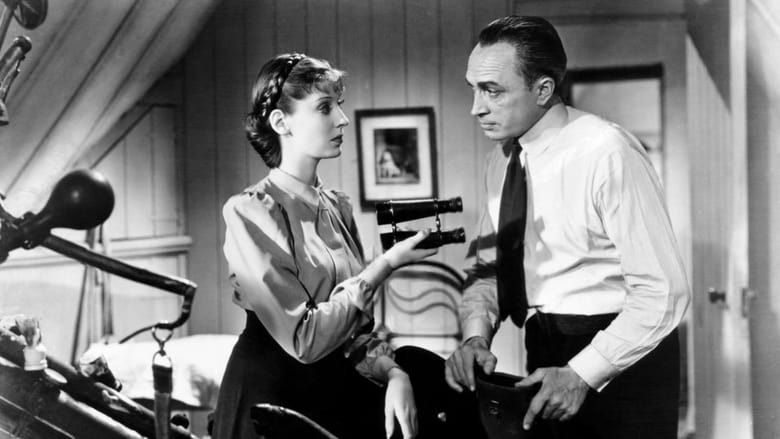
The Spy in Black (1939)
A German submarine is sent to the Orkney Isles in 1917 to sink the British fleet.
Watch Trailer
Cast
Similar titles
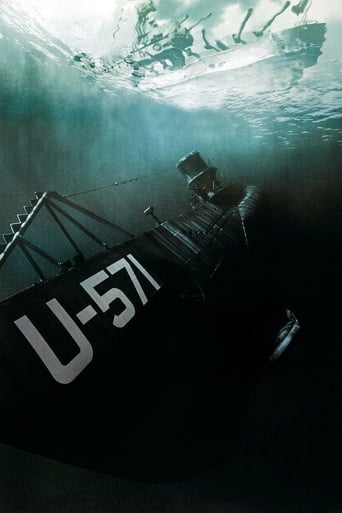
Reviews
Please don't spend money on this.
i must have seen a different film!!
Absolutely Fantastic
A terrific literary drama and character piece that shows how the process of creating art can be seen differently by those doing it and those looking at it from the outside.
An unusual spy thriller in that the main characters are all German spies or collaborators. THE SPY IN BLACK is set in Orkney in 1917, where a German U-boat captain has been sent to infiltrate the locals in respect of a planned attack. He soon develops a relationship with a school teacher who's also working for the Germans, and the stage is set for the forthcoming assault on the British fleet nearby.THE SPY IN BLACK offers far more than your usual war-time thriller, and it has a very interesting plot to boot. Michael Powell handles the direction superbly, crafting a fine-looking and atmospheric little thriller on what is obviously a low budget, and the small scale somehow adds to the effect. There are plenty of twists and turns in the short running time, many of which you won't see coming, alongside a ton of drama and incident.Headlining the cast is German actor Conrad Veidt, still packing a strong presence some 20 years after his role in THE CABINET OF DR CALIGARI. The supporting performers are equally effective, especially Sebastian Shaw as the turned British officer Ashington and Valerie Hobson as the spy-turned-schoolmistress. Altogether this is a highly effective thriller and one of the best of the decade.
It's a surprising movie. It's set in 1917, in the middle of the First World War, and it was released in 1939, a year in which Britain was at war with Germany. Yet the opening scenes show us Conrad Veidt and his officers returning from a successful cruise on their U-boat, and they're given a respectable showing, slightly comic. After sixteen days of subsistence on tinned sardines and herring, they cheerfully order a stew at their hotel, only to be told that it's a meatless day. Veidt is treated with respect and even sympathy. They aren't at all the sneering Nazi bastards that would show up in some later war films.Veidt and crew are sent on a mission to the Orkney Islands, near the Grand Fleet, where they will meet a young woman who is a German agent. Cut to a young woman on her way to the Orkney Islands to become the new head school mistress. The young lady is June Duprez. She's one of those British actresses, like Merle Oberon, who, from certain angles, are so near feminine perfection that they defy description. Duprez' eyes are catlike, only lacking vertical pupils. Neither she nor Oberon had careers that really took off, probably because they were mediocre actresses. Yet -- yum.Is June Duprez the spy that Veidt is meant to contact? Certainly not. In fact, Duprez' is etherized, kidnapped by the innocent-seeming German agents and held in a remote stone cottage, while a agenuine German agent substitutes herself. The agent is Valerie Hobson. Now, Hobson herself is no slouch when it comes to pulchritude, but it's a qualitatively different order of attractiveness. Duprez looks like she should be seated on your lap and stroked. Hobson's beauty is arid, elongated, elegant and impenetrable. If she were any more statuesque she'd look as if being drawn through a black hole in space. Her appeal is of the genre that suggests any intimacy between you might lead to your having a red rubber ball strapped in your mouth. Later, when Veidt puts some moves on the fake schoolteacher, she shoes him off and says, "You're not one of my pupils." Hm.Veidt's submarine makes its way the the Isle of Hoy in the Orkneys and he goes ashore on a motorbike to rendezvous with the local German agent. While rehearsing the plans with his officers he's compelled to recite "Die Lorelei", a poem by Heinrich Heine, which I once thought was just an anonymous folk song. Heine, who died in 1851, was one of Germany's best-known poets and one of the good guys in that the Nazis hated his work and burned his books. Anyway, the officers get a kick out of seeing their stern captain spout poetry.On the island, Hobson puts Veidt up in a room. Veidt refuses to remove his uniform. "If I'm going to be shot, it will be as an officer, not a spy." He doesn't know it but he's stumbled into a trap, a little too complicated to explain. Everything turns out to the advantage of the British, but the Germans, however many mistakes they make, are never deprived of dignity and pride. The print available on YouTube is one of the most crisply defined I've watched. The model work is of the period but there are some fine shots of destroyers and cruisers at sea. All in all, it's a well-made and thoroughly entertaining film.
This film was the first collaboration between Michael Powell and Emeric Pressburger. In this case, Michael Powell was the director, at which he did a superb job, and Pressburger wrote the screenplay, based upon a story by J. Storer Clouston. Four of Clouston's novels were filmed (one twice) between 1917 and 1939, this being the last. The other which tends to be known by cinéastes gave the story to Marcel Carné's farce set in Victorian London, DROLE DE DRAME (1937). This film, set in the First World War, is notable for the first credited appearance in a feature film of Marius Goring, who the following year would be so brilliant in the mystery film THE CASE OF THE FRIGHTENED LADY (1940, see my review), and go on to a splendid career. Here he plays Lieutenant Schuster, second in command of the German submarine U-29. The captain of that submarine is played by one of my favourite actors of the period, Conrad Veidt, whose early death only four years later at the age of only 50 was a great loss to the cinema, despite the fact that by that time he had already made 118 films (maybe that's what killed him!) Veidt is as usual noted for his gravitas and presence, and does an excellent job, despite there not being any character development or any scenes offering any particular acting challenge. The female lead is Valerie Hobson, who instead of being her usual beautiful and romantic self, here has to play an icy German agent. But in fact she is really a double agent, i.e. a British agent posing as a German agent. When she is being a British agent she is very nice, but when she is being a German agent, she is horrid. And of course that is very appropriate. This film was produced just before the Second World War began, and was a useful 'shot across the bow' of the complacent Chamberlain faction, reminding the public of the dangers of the Hun. In fact we see lots of real shots across the bow in this film because it involves naval espionage and naval actions. A considerable amount of real footage of the British fleet is incorporated in the film, showing many ships which must have been sunk within two or three years of the filming. We see battleships firing their guns, depths charges being fired by destroyers, ships travelling in convoy, and military historians can only react with glee at all these glimpses of the British Navy as it was just before hostilities with Germany recommenced. For the modern DVD, the film has been perfectly and lovingly remastered and restored by the British Film Institute's restoration team, those insufficiently appreciated heroes of the cinema, who by their expertise have preserved so much that is precious of our cinematic heritage, which would otherwise have been lost. (For one of their greatest triumphs, see the amazing silent film, UNDERGROUND, of 1928, and my review of it.) As for the story of this film, it is rather complicated and a gripping yarn. Helen Haye (who so dominated THE CASE OF THE FRIGHTENED LADY mentioned above) appears here as an arrogant and domineering German spy masquerading as an English aristocrat in a Rolls Royce, who throws a charming young girl off a cliff and into the sea without a qualm because she wishes to steal her identity for another German agent. The film is set in the Orkney Islands (good location footage there), and the German agent is meant to impersonate the new schoolmistress at Long Hope in order to spy upon the British Fleet at anchor in Scapa Flow. Veidt arrives by submarine to link up with her at her schoolhouse. One extraordinary feature of the story is that he brings a motorcycle with him in his submarine and lands it on the Orkneys in order to convince people that he must be a local, as how could anyone who was not a local and had arrived by submarine possibly have a motorcycle. What an amusing touch! It must be the first time in fiction or history that anyone ever transported his motorcycle underwater to an espionage rendezvous. (Or do US Navy Seals and British SAS do this all the time, one wonders. After all, a motorcycle could be useful in getting from one end of a submarine to anther quickly, couldn't it? I mean, if one wanted to countermand an order or just have a sandwich.) But the German agent who was meant to be the schoolmistress has herself been supplanted by Valerie Hobson, who just happens to speak perfect German. (She seems really to do this, so perhaps Valerie Hobson was actually a plant all along for her entire film career, secretly working for Hitler, which is why she married a British cabinet minister? That is a joke, folks, please do not sue.) Here Valerie Hobson is married to a British naval officer who pretends to be betraying his country but is not really doing so. The film is really very good indeed and also shows us what stuffed-shirts the local Scots were back then. I remember being stuck in Edinburgh on a Sunday long ago and being astonished to discover that all the cinemas and pubs were closed because it was 'the Lord's Day of Rest', and enjoying oneself was thought to be sinful. At the risk of being controversial, might I suggest that the true origins of the Taliban may lie deep within the recesses of the Scottish Kirk? And another thing, while I am on the subject of Scotland: they eat the most disgusting thing in the world, which is called 'white pudding'. I would rather eat a bowl of sheep's eyes any day than face another Scottish 'white pudding'. I won't try to describe it, but I leave its horrors to the imaginations of all fortunate enough never to have encountered one.
Just wanted to second the other user's comment.I saw this last night as part of a Michael Powell/Emeric Pressberger retrospective underway at the American Cinemetheque. There are some unlikely aspects to the plot, but on the whole this is well crafted WWI thriller with a remarkable level of moral complexity, especially given that it was made and released just as England was entering a second war against Germany.The protagonist (hero?) (played by the extraordinary Conrad Veidt) is a German officer on a spy mission and he is, in many respects, a quite admirable character. For the first half of the film, it's almost entirely from his point of view. It's hard to imagine Hollywood filmmakers EVER having the confidence that Powell and Pressberger clearly had in the intelligence of their audience, allowing them to actually like and admire an enemy agent.While "The Spy in Black" eventually does come down squarely on the side of the English, the agents of the Kaiser come off only as perhaps a hair more ruthless than those fighting for king and country.Of course, the Germany that England would be fighting within a few a few months would be far, far worse. This film is a potent reminder that while World War II might have a morally clear "good" war because of the vast evil of the Nazis, World War I was a horse of a far grayer color.With sophisticated, occasionally black humor, this is a neat bit of old-fashioned movie entertainment with some genuinely intriguing differences. Enthusaistically recommended.
